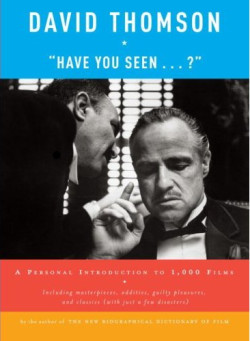“Have You Seen … ?”
 David Thomson’s “Have You Seen … ?”: A Personal Introduction to 1,000 Films is the book that I’d been waiting for from the author of the Biographical Dictionary of Film. And I can’t imagine that I’m alone among his frustrated fans in being disappointed that his new tome reveals that the faults of his seminal, agitating Dictionary lie with the author and not with the constraints of that book.
David Thomson’s “Have You Seen … ?”: A Personal Introduction to 1,000 Films is the book that I’d been waiting for from the author of the Biographical Dictionary of Film. And I can’t imagine that I’m alone among his frustrated fans in being disappointed that his new tome reveals that the faults of his seminal, agitating Dictionary lie with the author and not with the constraints of that book.
My hope with “Have You Seen … ?” (released in hardcover earlier this month) was that, freed of the strictures of a nominal reference work spanning the careers of directors, writers, actors, and craftspeople, Thomson’s prose and insights would shine unfettered. Each of these roughly-500-word essays would dazzle with Thomson’s densely ambiguous prose; the laziness and dismissiveness that often marred the Dictionary would fall away. (In the 2002 edition, on Wes Anderson, he wrote: “Watch this space. What does that mean? That he might be something one day.” He has since expanded on those 14 cryptic words. On Richard Donner: “”Mr. Donner has made several of the most successful and least interesting films of his age. And one doubts it’s over yet.” One expects those are his final words on the subject.)
Yet “Have You Seen … ?” is even more maddening, because Thomson is no longer at the mercy of duty. He could justify leaving out Citizen Kane and The Godfathers and anything else in the “canon,” because it’s a “personal introduction to 1,000 films.” He makes no claims to anything but the number and the medium.
And, still, there is the laziness.
Consider the first sentence of his entry on The Exorcist:
“Nothing dates worse than horror.”
Compare that to the second sentence on Don’t Look Now:
“Almost inevitably that experience ends in disappointment and the historical evidence that no genre dates quicker than horror.”
The book is arranged alphabetically by title, so these essays are in close proximity. Were it arranged chronologically, they would be even closer, as they were both released in 1973. Granted, the meaning is slightly different (horror aging badly in the first case and dating quickly in the second), but he’s fundamentally repeating himself.
Yes, I’m nitpicking, but the book is littered with bad writing.
There’s the repetition of conventional wisdom, such as the opening on Rear Window:
“There are great films and great entertainments. Sometimes one film is both – take Rear Window.”
No shit! What a novel thought!
There are contradictions creating inscrutability, such as this on The Player:
“[Y]ou’ll never get bored with actors like these to study: Tim Robbins (always equivocal as Griffin Mill), Greta Scacchi (wasted), Fred Ward, Whoopi Goldberg (not very good) … .”
So I shan’t be bored watching one wasted actress and one not-very-good performance?
And there’s the largest offender, the soft, squishy, meaningless essay-closing credits summary, with unconventionally active predicates, such as this on Poltergeist:
“Matthew Leonetti shot it. Michael Kahn edited. Jerry Goldsmith did the music, and there are a lot of special effects credits.”
 I’m being harsh, but that’s because Thomson is so clearly better than these passages, which he could have written while unconscious.
I’m being harsh, but that’s because Thomson is so clearly better than these passages, which he could have written while unconscious.
When he’s inspired and passionate and thoughtful and careful, his writing is compact but rich, incisive but mysterious, and authoritative but not didactic. These sentences are instantly illuminating but need to be studied to be fully understood and appreciated.
On Night Moves, for example:
“Night Moves is gloomy, downcast, and grown-up. It’s exactly what America deserved at the time: an unforced use of the thriller genre to show far-reaching dishonesty.”
And No Country for Old Men:
“That sounds terribly bleak, but just as [novelist Cormac] McCarthy lifts himself from despair by the burning clarity of his writing so the Coen Brothers have made the film as if Chigurh was after them, too. Much as I admire the film, I have to say that this tautness only exposes the slackness and the cute nihilism of so many of their films. But this is the real quiet terror alluded to in Miller’s Crossing and Fargo, laughed off in too many other films.”
Surely the problems with “Have You Seen … ?” (and the Biographical Dictionary) stem mostly from the massive scale of the projects. Who has time for revising and rewriting when there are 647 essays to go? Thomson seems to spend so much time on the impressiveness of the scope that he neglects the individual components.
As a result, “Have You Seen … ?” reads as a collection primarily composed of lightly revised first drafts; some entries look like little more than transcribed notes. Thomson pays little attention to his leads or his closings or the shape of the essay or argument, instead skating by on his frequent bursts of brilliance.
There is greatness here, buried in bland.


This seems to be the most polarizing film book in recent memory. Every review I’ve read cites its brilliance and density. I plan to check it out sometime in the near future, but I have to pause, just based on the cover. In conjunction with your “no shit!” comment on “Rear Window,” the same goes for having a “Godfather” still. Don’t get me wrong, I love the film, but isn’t that just a bit too easy?
It’s really easy, and completely incongruous with the book’s title. Who could imagine that a film critic has seen The Godfather?